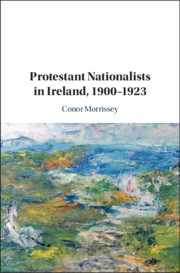Book contents
- Protestant Nationalists in Ireland, 1900–1923
- Protestant Nationalists in Ireland, 1900–1923
- Copyright page
- Dedication
- Contents
- Tables
- Acknowledgements
- Irish-Language Terms Used
- Abbreviations
- Introduction
- 1 Radicals, c. 1900–1910
- 2 Dissidents, 1900–1910
- 3 Converts, c. 1910–1916
- 4 Militants, 1912–1916
- 5 Rebels, 1916–1917
- 6 Outsiders?, 1918–1921
- 7 Revolutionaries, 1919–1923
- 8 Free Staters, 1922–1923
- Conclusion
- Bibliography
- Index
1 - Radicals, c. 1900–1910
Published online by Cambridge University Press: 11 October 2019
- Protestant Nationalists in Ireland, 1900–1923
- Protestant Nationalists in Ireland, 1900–1923
- Copyright page
- Dedication
- Contents
- Tables
- Acknowledgements
- Irish-Language Terms Used
- Abbreviations
- Introduction
- 1 Radicals, c. 1900–1910
- 2 Dissidents, 1900–1910
- 3 Converts, c. 1910–1916
- 4 Militants, 1912–1916
- 5 Rebels, 1916–1917
- 6 Outsiders?, 1918–1921
- 7 Revolutionaries, 1919–1923
- 8 Free Staters, 1922–1923
- Conclusion
- Bibliography
- Index
Summary
This chapter describes the influence of the Gaelic Revival on the creation of a Protestant nationalist counterculture during the first decade of the twentieth century. It discusses the manner in which cultural activism, by means of literature, the theatre, and learning the Irish language, tended to radicalise Protestants, and led them to convert to nationalism. It charts the development of a largely Dublin-based network of Protestant activists, whose development towards nationalism was largely actuated by means of immersion in the Abbey Theatre, the Gaelic League and various literary societies. Irish nationalist opposition to the Second Boer War, which radicalised some Protestant Gaelic Leaguers, is discussed. This chapter describes the attitude of two prominent Catholic newspaper editors, Arthur Griffith and D. P. Moran, towards Protestant nationalists, with Griffith seeking to incorporate Protestants into the nationalist movement, and Moran seeking their exclusion. The final section analyses Protestant Gaelic Leaguers’ attempts to form their own associational culture, which led to tensions within the movement. Ultimately, this chapter shows how Protestant involvement in the Gaelic League sometimes led to conversion to nationalism, but could cause unease among other Protestants, who sought an apolitical organisation.
- Type
- Chapter
- Information
- Protestant Nationalists in Ireland, 1900–1923 , pp. 20 - 44Publisher: Cambridge University PressPrint publication year: 2019

